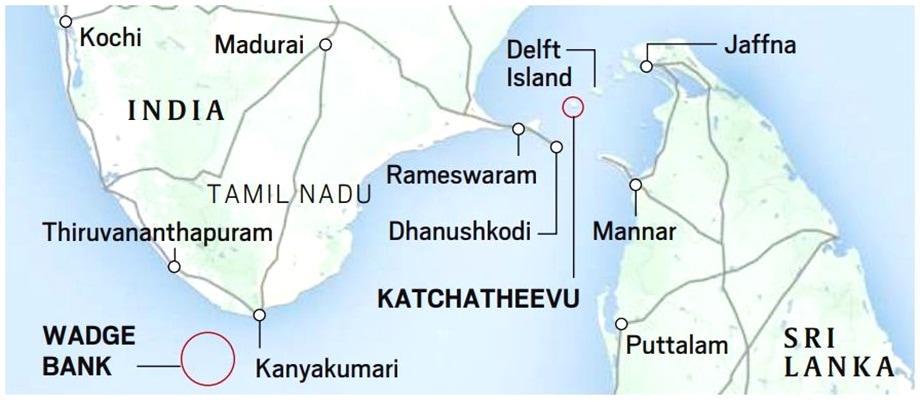PYQ Relevance[UPSC 2013] In respect of India — Sri Lanka relations, discuss how domestic factors influence foreign policy. Linkage: The Katchatheevu and Palk Strait disputes show how domestic pressures from Tamil Nadu, fishing community demands, political rhetoric, and cultural ties with Sri Lankan Tamils, directly shape India’s diplomatic posture with Colombo. Balancing these domestic concerns with treaty obligations and ecological imperatives defines the contours of India’s foreign policy. This reflects how internal politics often intersect with external relations in South Asia. |
Mentor’s Comment
The Katchatheevu and Palk Straits disputes highlight the fine balance India must strike between diplomacy, livelihood, and ecological sustainability. While political rhetoric often overshadows the nuanced reality, the recent revival of dialogue between India and Sri Lanka offers an opportunity to convert conflict into cooperation. This article unpacks the legal, ecological, and humanitarian dimensions of the issue and offers insights useful for UPSC Mains aspirants.
Introduction
India’s neighbourhood diplomacy has been historically guided by Panchsheel, the Non-Aligned Movement, SAARC, and now the Neighbourhood First Policy. Yet, challenges with Sri Lanka, notably the fisheries dispute in the Palk Straits and the sovereignty of Katchatheevu island, continue to test this vision. Prime Minister Modi’s April 2025 visit to Colombo revived discussions on these long-standing issues, calling for a “humane approach” that reconciles livelihoods and ecological imperatives. The stakes are high: peace in the Palk Straits is not just about maritime boundaries but about human security, sustainability, and regional goodwill.
The Katchatheevu and Palk Strait Issue
|
Livelihood and conservation at odds
- Shared history: Fishing communities of Tamil Nadu and Northern Sri Lanka have relied on the Palk Straits for centuries.
- Destructive practices: Indian mechanised bottom trawlers enter Sri Lankan waters, violating conservation norms.
- Legal framework: UNCLOS and FAO’s 1995 Code of Conduct prohibit destructive fishing; Sri Lanka banned bottom trawling in 2017.
- Ecological damage: Coral beds and shrimp habitats are destroyed; fish stocks are depleted.
- Internal conflict: Traditional Tamil Nadu artisanal fishers also lose out, creating intra-community livelihood clashes.
Clearing the misconceptions around Katchatheevu
- Tiny territory: Katchatheevu is less than half a square mile, barren except for St. Anthony’s church.
- Treaty status: The 1974 India-Sri Lanka Maritime Boundary Treaty gave it to Sri Lanka; under international law, such treaties are binding.
- Legal precedents: Minquiers and Ecrehos (UK vs France, 1953) and Rann of Kutch (India-Pakistan, 1968) show administrative control outweighs historical claims.
- Clarification: Myths such as “Indira Gandhi gifting the island” are misleading; historical records supported Sri Lanka’s claim.
- Key point: Fishing rights are separate from sovereignty, and Katchatheevu is not the root of the dispute.
Towards cooperative fisheries management
- Historic waters: Indian and Sri Lankan law recognise the Palk Straits as historic waters, giving stronger sovereign rights.
- UNCLOS Article 123: Mandates cooperation in semi-enclosed seas.
- Models for India-Sri Lanka:
- Baltic Sea Fisheries Convention (quota-sharing).
- Possible steps: Joint research station on Katchatheevu, regulated quotas, seasonal access, promotion of deep-sea fishing in India’s EEZ.
Building empathy and fraternity
- Shared suffering: Sri Lankan Tamil fishers lost decades of livelihood during the civil war due to military restrictions.
- Goodwill memory: Tamil refugees were welcomed in Tamil Nadu during the conflict.
- Role of Tamil leaders: MPs and media in Sri Lanka can sensitise Tamil Nadu fishers to hardships across the strait.
- Narrative shift: Sri Lankan Tamils are not aggressors but fellow victims of history.
India’s neighbourhood policy in action
- Diplomatic tradition: Panchsheel, NAM, SAARC, Neighbourhood First Policy.
- Way forward: Prioritise livelihood security, ecological sustainability, and treaty respect over populism.
- Multi-level engagement: Government-to-government, State/Provincial dialogue, community interaction.
- Larger vision: Transform Palk Straits from a zone of conflict to a symbol of cooperation.
Conclusion
The Katchatheevu issue is legally settled and should not distract from the real crisis, sustainable fisheries management in the Palk Straits. Balancing artisanal livelihoods, ecological imperatives, and regional goodwill requires cooperative frameworks and empathy. If pursued with prudence, India and Sri Lanka can convert disputes into opportunities, strengthening the Neighbourhood First Policy and ensuring that smaller conflicts do not overshadow South Asia’s collective future of peace and prosperity.
Get an IAS/IPS ranker as your 1: 1 personal mentor for UPSC 2024


